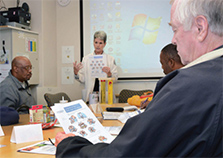Office of Research & Development |
 |

VA Research Currents archive
October 21, 2014

Nurse Adrienne Wagenblast teaches about diabetes during a shared medical appointment at the Durham VA. (Photo by Linnie Skidmore)
A VA team's review of past research gives a thumbs-up to shared medical appointments for diabetes patients.
Shared medical appointments are growing in popularity in primary care. They are seen as a way to cut waiting times and boost care for those with chronic diseases like diabetes or high blood pressure. They also reduce costs.
In VA, the approach is common. Typically, a multi-disciplinary team meets with anywhere from 8 to 20 patients for up to two hours. Researchers who have studied the model say patients get support from their peers and learn new strategies from them, and that they like the team care. The professionals who work with the groups report a high sense of camaraderie.
But do patient outcomes improve? The new study says yes. A team led by Dr. David Edelman at the Durham VA Medical Center and Duke University reviewed 17 past studies that compared shared medical appointments with usual care for patients with diabetes. The shared appointments worked. On average, patients saw significant drops in blood sugar levels and blood pressure, although there were no improvements in LDL ("bad") cholesterol.
The researchers say there wasn't enough data to draw conclusions about other outcomes, such as patients' overall use of health care or costs. (Journal of General Internal Medicine, online Aug. 9, 2014)